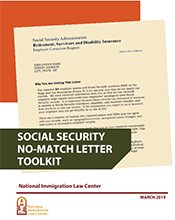Know Your Rights about the Social Security No-Match Letter
The Social Security Administration (SSA) announced in July 2018 via its Employer Correction Request Notices (EDCOR) webpage that, beginning in the spring of 2019, it will send “Employer Correction Request” letters, also known as “no-match letters,” to every employer that has at least one Social Security “no-match.”
The SSA announcement reflects a significant change in policy.
♦ ♦ ♦
THE SOCIAL SECURITY ADMINISTRATION can send “no-match” letters to workers and employers when the workers’ names and Social Security numbers do not match. The stated purpose of these letters is to ensure that the Social Security payments an employer makes on an employee’s behalf are properly credited to the employee’s name in the Social Security system. In these letters, SSA requests that employers correct the no-match by presenting updated name and SSN information for any employee listed in the letter, using an IRS Form W-2c. SSA has announced it will resume sending no-match letters to employers in the spring of 2019. Many employers continue to be concerned and confused about no-match letters, so it is important that you know your rights.
The information in this document does not constitute legal advice and does not replace the advice of an experienced employment or immigration attorney.
YOUR RIGHTS
If your employer says it has received information from SSA that your name and Social Security number (SSN) do not match, here is what you should know:
• Your employer should not discipline or fire you only because of a no-match letter. In fact, the no-match letter states very clearly that employers are not supposed to “take adverse action” against you because information about you appears in the no-match letter. In other words, your employer should not fire you, change your work assignments, or reduce your pay based on a no-match letter. An employer that does so may be violating the law.
• When you were hired, you should have filled out an I-9 form and shown your employer documents that prove your identity and eligibility to work in the U.S. After you have completed that form, you do not have to answer any other questions from your employer about your immigration status except in limited circumstances. If your SSN is listed in a no-match letter, this is not evidence that you are undocumented. If your employer asks you for proof of your immigration status or your eligibility to work simply because it received a no-match letter, the employer may be violating the law.
• The no-match letter requests that your employer update your name and SSN on IRS Form W-2c. SSA is attempting to ensure the accuracy of your earnings record. Therefore, your employer may contact you to correct your personal information on your W-2 form.
• When you were hired, if you showed your employer identity and work authorization documents that did not belong to you, do not show those documents again to your employer. A worker who does so may be violating the law.
• All non–U.S. citizen workers have the right to remain silent about their immigration status, the right to work without being retaliated against, the right to organize with coworkers, and the right to be paid properly for their work.
DO’S AND DON’TS
- Present your employer with a letter requesting more information.
- Ask your employer for a copy of the original no-match letter.
- Ask your employer when the company received the no-match letter. If it received the letter some time ago, ask why it is just informing you now.
- Review the information contained in the W-2 form (that your employer originally submitted for you), if possible, and provide any needed corrections.
- Tell your employer that you want a coworker, community advocate, or union representative present in any meetings with management about the letter.
- If you are represented by a labor union, immediately contact your union representative. Your union contract with the employer may give you more rights if you are listed in a no-match letter.
- Attend worker meetings on no-match and get workers involved.
- Contact a community organization if you feel that you have been singled out because of your citizenship status or national origin, or if you feel your boss is retaliating against you.
- Don’t panic or be afraid! Being listed in a no-match letter does not mean you’re ineligible to be employed in the U.S.
- Don’t talk to anyone at your workplace about your immigration status. Doing so may carry serious legal consequences for you and your coworkers.
- Don’t quit your job just because your employer tells you that your Social Security number was listed in a no-match letter.
- Don’t notify your employer if you got a no- match letter at home. Just because you got one does not mean that your boss will also get a letter.
- Don’t give (or re-give) your employer a Social Security number that does not belong to you. Doing so may carry serious legal consequences for you.
- Don’t forget that immigration law has antidiscrimination protections for workers. If your boss chooses to reverify your employment eligibility, the employer must follow the law while doing so. The employer may not choose which documents you are allowed to present in order to comply with the Form I-9 requirements.






